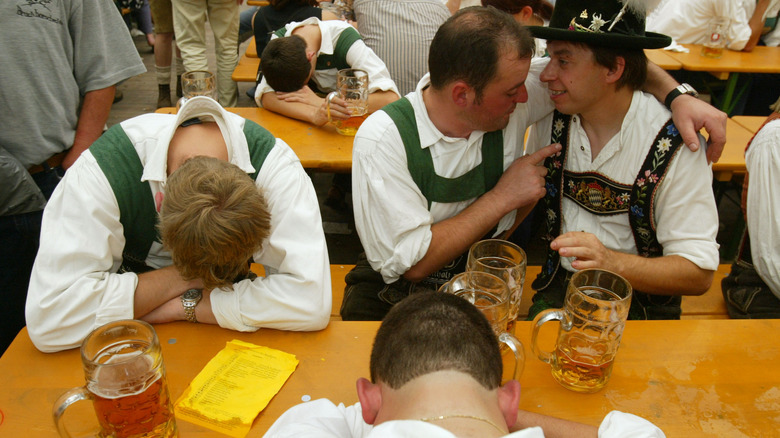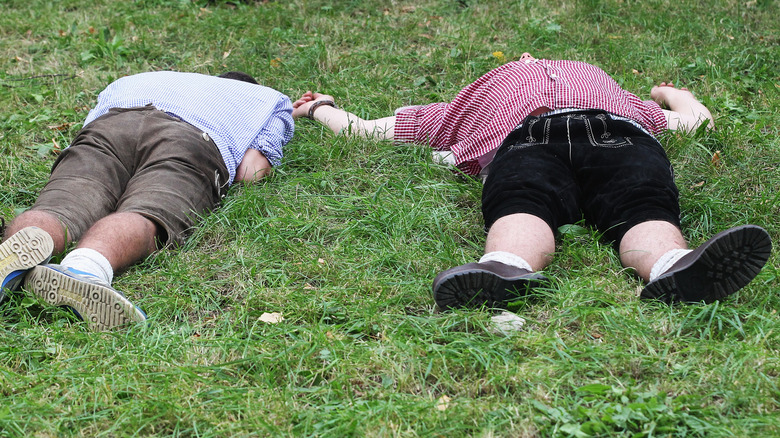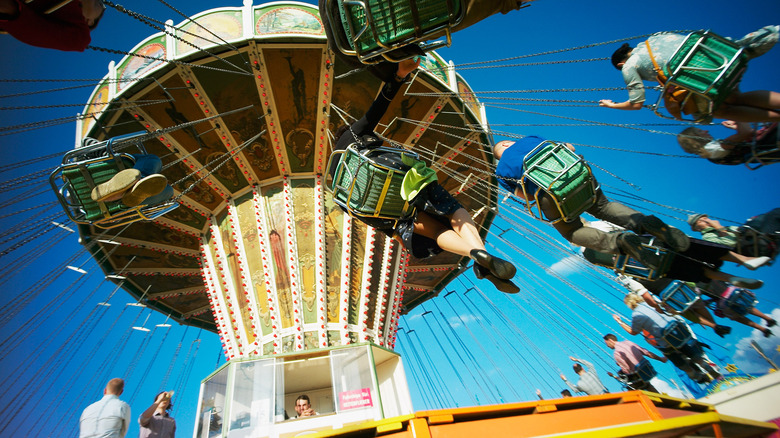Why Oktoberfest Leaves Many With Alcohol Poisoning
Every year in September, around 6 million people descend on the city of Munich, Bavaria, to attend one of the booziest events in the world cultural calendar: Oktoberfest. Revolving around the offerings of the federal state's six historic breweries — Augustiner, Hacker-Pschorr, Hofbräu, Löwenbräu, Paulaner, and Spaten – the festival has evolved beyond its origins as a horse racing event to celebrate the wedding of Ludwig I of Bavaria into the biggest drinking session in the world. But it wasn't always alcohol-fuelled.
According to the Augustiner brewery, Bavarian beer barely featured at Oktoberfest in the early years of its formation in the 1810s, and back then the intoxicating beverage was only a side attraction, reserved for small stalls around the festival site. Today, the event is dominated by the enormous and chaotic beer tents managed by the breweries, in which many thousands of visitors eat and drink their fill to the sound of traditional Bavarian music, the clatter of cutlery, and slurred drinking songs. Oktoberfest is a cultural institution, but the huge amount of beer consumed over the course of just over two weeks means, unsurprisingly, that there are always plenty of people who overdo it, leading to hundreds of cases of alcohol poisoning that require medical attention.
Oktoberfest: The stats
One look at how much beer is consumed in Munich during the Oktoberfest period gives ample explanation as to why alcohol poisoning is so prevalent during the festival. According to Statista, on average more than 7 million liters (1.85 million gallons) of beer have been poured at Oktoberfest each year since 2010, with the amount growing steadily since records began in 1980.
The sheer number of people that descend on Munich during the festival period in September and October lead to some shocking statistics. In 2013, The Local reported that on average, one reveler every 10 minutes required medical attention throughout that year's Oktoberfest. Part of this is due to the strength of the beer. As everything served at Oktoberfest comes from Munich's big six breweries and adheres to the state's beer purity laws, anything visitors drink will be stronger than 5% alcohol — no light beer here!
Though Oktoberfest continues to be a popular drinking destination, the frequency of alcohol poisonings waxes and wanes year by year. A 2019 Oktoberfest review claims that 6,000 people received some form of alcohol-related medical attention, but that out of the millions that attended, 600 were treated for alcohol poisoning, down from around 720 the year before.
But it's not just about drinking
News reports typically focus on the hedonistic and dissolute aspects of Oktoberfest, but while the festival undoubtedly has its fair share of large groups of beer lovers drinking themselves to oblivion, to say this is what the event is all about would be to do Oktoberfest a disservice.
The fact is that despite the hospitalizations and the ubiquity of "beer corpses" — the German phrase for those who drink so much they pass out on the ground – Oktoberfest's appeal goes far beyond what's in your glass. The festival is also a gastronomic experience, with over 80,000 pork knuckles, 120,000 pairs of sausages, 124 oxen, and 500,000 roast chickens being consumed in 2019, per the Oktoberfest website.
Beyond that, Oktoberfest is known for its traditional music, as well as a best song competition where one performer is crowned with having delivered the "Wiesnhit," or best song, as well as a number of fairground attractions that ensure the event is family-friendly no matter how much alcohol is consumed.


